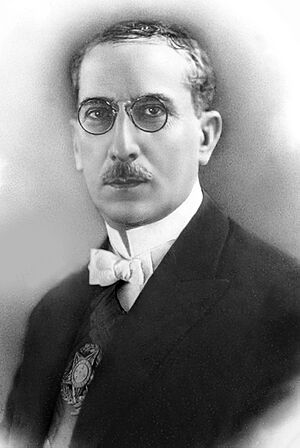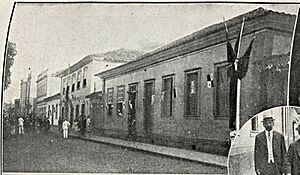Artur Bernardes facts for kids
Quick facts for kids
Artur Bernardes
|
|||||||||||||||||||||||||||||||
|---|---|---|---|---|---|---|---|---|---|---|---|---|---|---|---|---|---|---|---|---|---|---|---|---|---|---|---|---|---|---|---|

Official portrait, 1922
|
|||||||||||||||||||||||||||||||
| President of Brazil | |||||||||||||||||||||||||||||||
| In office 15 November 1922 – 15 November 1926 |
|||||||||||||||||||||||||||||||
| Vice President | Estácio Coimbra | ||||||||||||||||||||||||||||||
| Preceded by | Epitácio Pessoa | ||||||||||||||||||||||||||||||
| Succeeded by | Washington Luís | ||||||||||||||||||||||||||||||
|
|||||||||||||||||||||||||||||||
| Personal details | |||||||||||||||||||||||||||||||
| Born |
Artur da Silva Bernardes
8 August 1875 Viçosa, Minas Gerais, Empire of Brazil |
||||||||||||||||||||||||||||||
| Died | 23 March 1955 (aged 79) Rio de Janeiro, Federal District, Brazil |
||||||||||||||||||||||||||||||
| Political party | PRM (1900–1937) UDN (1945) PR (1945–1955) |
||||||||||||||||||||||||||||||
| Spouse |
Clélia Vaz de Melo
(m. 1903) |
||||||||||||||||||||||||||||||
| Alma mater | Faculty of Law of Largo de São Francisco | ||||||||||||||||||||||||||||||
| Signature | |||||||||||||||||||||||||||||||
Artur da Silva Bernardes (Portuguese: [aʁˈtuʁ da ˈsiwvɐ beʁˈnaʁdʒis]; 8 August 1875 – 23 March 1955) was a Brazilian lawyer and politician who served the 12th president of Brazil from 1922 to 1926. Bernades' presidency was marked by the crisis of the First Brazilian Republic and the almost uninterrupted duration of a state of emergency. In his long political career, from 1905 until his death, he was the main leader of the Republican Party of Minas Gerais (PRM) from 1918–1922 until the party's extinction in 1937, and founder and leader of the Republican Party (PR).
Before his presidency, Bernardes served as governor of Minas Gerais from 1918 to 1922, during which time he founded the current Federal University of Viçosa and prevented American investor Percival Farquhar from exploiting the iron ore deposits in Itabira, cultivating an image of a nationalist and municipalist leader. A status quo and "milk coffee" candidate in the 1922 presidential election, Bernardes was the target of fake letters to harm his image and an attempted coup to prevent his inauguration, the Copacabana Fort revolt. His administration was unpopular in the cities, especially in Rio de Janeiro, and from July 1924 onwards he was attacked by conspiracies and armed revolts by tenentists.
Bernardes attitude towards the opposition was uncompromising and authoritarian. Out of the states that opposed his candidacy, Rio de Janeiro and Bahia had their dominant parties overthrown, and Rio Grande do Sul fell into a civil war, the Revolution of 1923, in which the federal government brokered a peace deal. In the capital, the political police were reorganized into the 4th Auxiliary Police Bureau. Hundreds of rebel military personnel, worker activists, especially anarchists, and other civilians died in the bombing of São Paulo and the penal colony of Clevelândia. No amnesty was granted to the rebels.
The administration also applied an economic policy of austerity and monetary contraction, fighting inflation and currency devaluation, withdrew Brazil from the League of Nations, carried out a centralizing constitutional reform, the only one of the First Republic, brought the State closer to the Catholic Church, and approved some labor laws while repressing unions. After his presidency, Bernardes supported the Revolution of 1930, but in the following years he saw the PRM reduced to a minority faction in Minas Gerais. In his last years he participated in the Oil Campaign. An austere and reserved man, Bernardes was idolized by his followers, the Bernardists, and hated by his enemies.
Early life and family
Artur da Silva Bernardes was born on 8 August 1875 in the village of Santa Rita do Turvo, currently Viçosa, as recognized in history books. His birthplace is disputed by municipality of Cipotânea, where it is stated that the future president was born there, at the time part of Alto Rio Doce, and moved to Viçosa, an already constituted city, at the age of 5. Bernardes was the fourth of nine children born to Antônio da Silva Bernardes and Maria Aniceta Bernardes. One of his brothers, Olegário, would become minister of the Federal Court of Audits, state deputy in Rio de Janeiro and mayor of Teresópolis.
Bernardes' mother descended from the Vieira de Sousa family, one of the coffee nobility families of the Zona da Mata, and his father, a Portuguese immigrant from Castanheira de Pera, a colonel of the National Guard and lawyer in the districts of Alto Rio Doce, Piranga and Viçosa. In the latter he was the first appointed lawyer and then prosecutor. According to some biographies, Antônio Bernardes did not attend more than primary school in Portugal. This family was wealthy enough to pay for their son's education, but did not belong to the local political group.
Bernardes' strict family education was complemented by the traditional Caraça School, where he was enrolled for secondary studies at the end of 1887, at the age of 12. The Caraça School was one of the most prestigious schools in the country. Gilberto Freyre called it a "sad manor in the mountains". The school's schedules control, restriction of visits, surveillance and punishments left their mark on the children of the Minas Gerais elite. The teachers lived in a cloister and penance and "the paddle passed from class to class, from hall to hall, from playground to playground, leveling everyone with its overwhelming dominance".
This experience allowed Bernardes to "value disciplinary power as a shaper of minds and bodies for the nation", in addition to establishing his Catholic religiosity for the rest of his life, while many of his contemporaries flirted with positivism and evolutionism. A favorable biography at the Historic and Geographic Institute of Minas Gerais, of which Bernardes is the patron of a chair, stated that the teachings at Caraça "had a great influence on his moral, religious and public formation: the zeal for the public cause, the scrupulousness in the distribution of government money, the spirit of discipline, order and austerity". At the other extreme, the anti-Bernardist book Terra Desumana (1926), by Assis Chateaubriand, argued that the school instilled in the young Bernardes an authoritarian personality, making him more interested in laws than in human feelings.
At the end of 1889, Bernardes family was no longer able to keep him in Caraça due to the impact of the abolition of slavery on Brazil's coffee economy. The solution came from his brother-in-law José da Graça Sousa Pereira, a partner at the firm Pena e Graça, where Bernardes got a job. This firm in the Viçosa district of Coimbra intermediated the coffee trade between producers and exporters, exposing Bernardes to the rural world. This experience continued in his next job, at the firm Adriano Teles, in Visconde do Rio Branco, where he reached the position of bookkeeper (accountant) at the age of 18, in 1894. The position was the highest an employee could reach and gave access to confidential information, proving that Bernardes was a trustworthy employee. His life in Rio Branco exposed him to the problems of modernizing agricultural techniques, as the business group advertised Brazilian products abroad.
Law and journalism
With his family in a better financial condition, at the end of 1894 Bernardes was able to enroll in the Externato do Ginásio Mineiro in Ouro Preto, taking advantage of a decree from the state government that opened separate enrollments. There he studied for preparatory exams (equivalent to a university entrance exam) while living in a boarding house and working at several newspapers and briefly as a Post and Telegraph courier. Under the influence of his father and the Caraça School, Bernardes enrolled at the Free Faculty of Law, initially as an attendee student, in 1896, before passing the exams and entering the second year in 1897.
As a law student, Bernardes became friends with his colleague and future political ally Raul Soares de Moura, in addition to meeting other figures of future political relevance in Brazil such as Fernando de Melo Viana and José Vieira Marques. In March, Bernardes volunteered for the Bias Fortes Patriotic Battalion, in the context of the War of Canudos, but the unit never went out to fight. Politically, Bernardes was among the admirers of Floriano Peixoto, president of Brazil from 1891 to 1894. The anniversary of the abolition of slavery was commemorated with the creation of the newspaper Academia, of which Bernardes was editor. The following year the Faculty of Law was transferred to Belo Horizonte, but Bernardes, Raul Soares and others preferred to be transfered to the Faculty of Law of São Paulo, which offered much better opportunities in public life; the only other alternative for the political elite with a degree in Law was the Faculty of Law of Recife. Of the twelve presidents of the First Brazilian Republic, seven had diplomas from Faculty of Law of São Paulo.
In São Paulo, Bernardes worked an editor for the newspaper Correio Paulistano, a member of the Notary's Office of Senator Álvaro de Carvalho's father and a professor of Portuguese and Latin at the Institute of Sciences and Letters of São Paulo. Bernardes and Raul Soares became friends with another native of Minas Gerais at the Faculty, Arduíno Bolívar, and possibly joined an academic secret society, the Bucha. During holidays, contact was maintained through letters, and during one of these periods, in 1899, Bernardes gained fame defending a defendant in the Viçosa criminal court. The accuser was his father. Upon receiving his bachelor's degree in Legal and Social Sciences in December 1900, he pursued a career as attorney. Prestigious among his colleagues, Bernardes was chosen for the graduation speech. After arriving in his native Viçosa, Bernardes was welcomed with a demonstration at the train station and a ball. A bachelor's degree in Law raised his social status. The district had few qualified lawyers, and his professional colleagues had a strong presence in the Brazilian republican state, as they intermediated public and private interests.
At the age of 25, still in 1900, Bernardes opened a law firm in Viçosa. Shortly afterwards, his father resigned from his position as prosecutor to avoid a conflict of interest with his son's career. The next two years were filled with constant travel to neighboring cities. In addition to law, Bernardes started working at the weekly Cidade de Viçosa, owned by a local political leader, senator Carlos Vaz de Melo, leader of local directories and supporters of the Republican Party of Minas Gerais (PRM), the only one in the state. The PRM represented the interests of southern Minas Gerais and the Zona da Mata, and Viçosa was a municipality with significant agricultural production in the Mata, although it was not among the largest in the region. Bernardes' interest in politics was visible. Since his academic days, Cidade de Viçosa presented him as a member of the local elite and representative of bourgeois values, and he published several articles in the newspaper, including an article on the revision of Brazil's 1891 Constitution in 1901.
Honours
Foreign Honours
 Grand Officer of the Order of Christ, Portugal (17 May 1958)
Grand Officer of the Order of Christ, Portugal (17 May 1958)
See also
 In Spanish: Artur Bernardes para niños
In Spanish: Artur Bernardes para niños




